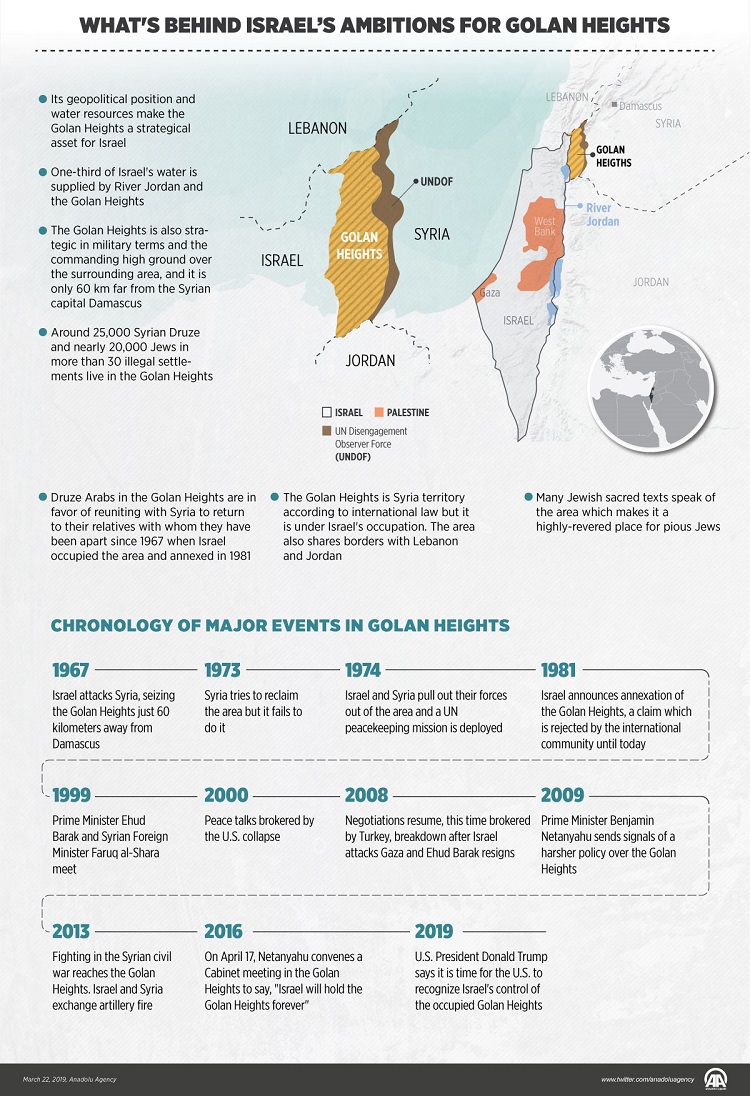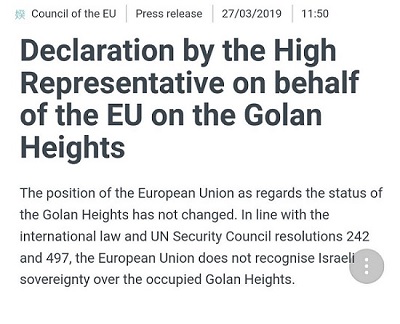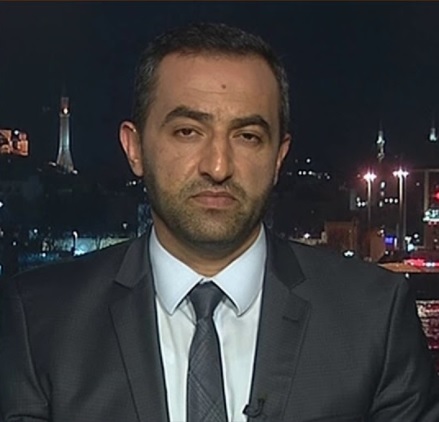
president Donald Trump’s decision to recognise the Israeli sovereignty over the Golan Heights has been geopolitically interpreted as a timely move just before the Israeli elections. Nonetheless, his sporadic controversial proclamations/tweets need to be perceived in a multidimensional context. Some researchers argue that Trump’s Golan Heights’ move has to do with American domestic politics as well. While others claim it is rather a manifestation of America’s foreign policy paradigmatic shift especially in the Middle East.
This paper probes into the motives and drivers of Trump’s proclamation; and whether it is a political manoeuvre or a revitalisation of unequivocal commitment to the Evangelical Christian base after losing the majority of the House of Representatives in the mid-term elections of November 2018. The paper also examines whether there is a correlation between Trump’s Golan decision and his approaching presidential bid for the 2020 elections. It addresses the current political dynamics between the White House, the Congress, the Republican and Democratic parties and their shadows on Trump’s Middle East orientations. Finally, the paper aims to navigate the international community relevance to the American policy; and whether such unilateral moves can cast shadows on the bilateral alliances or probably increase the current disarticulation between the Transatlantic Alliance member states.
As usual, it all starts with a tweet; President Trump wrote on Twitter “After 52 years, it is time for the United States to fully recognize Israel’s Sovereignty over the Golan Heights, which is of critical strategic and security importance to the State of Israel and Regional Stability.” (1) On March 25, 2019, Trump signed an official decree ceremoniously acknowledging Israel’s annexation of the Golan Heights. Israel occupied the Syrian territory during the Six-Day War in 1967 and formally annexed it in 1981. Trump has ‘overridden his people’ by his sudden proclamation. The decision surprised even his Secretary of State Mike Pompeo, who was on a visit to the Middle East when his president made the announcement. Prior to the unexpected decision, Pompeo stated Washington’s enduring policy of not acknowledging Israel’s occupation of the Golan Heights would not change. He also said Trump’s proclamation does not mean Washington would recognize Israel’s sovereignty over the Occupied West Bank. (2)
Interestingly during the same visit, Pompeo agreed, “Donald Trump may have been sent by God to save Jews and that Trump is just like Queen Esther, who is sent to save the Jewish people… As a Christian, I certainly believe that’s possible.” Pompeo’s answer could be a pure echo of his own beliefs or it might be merely an attempt to boost Netanyahu’s re-election campaign. (3) The timing of Trump’s proclamation was obviously a boost of Netanyahu’s electoral campaign. It adds to his unprecedented international diplomatic inroads starting with the normalization with some Arab States and enhancement of economic and diplomatic ties with the African continent. Since Barack Obama’s assumed presidency in 2009, Netanyahu has been staunchly lobbying for such a dramatic paradigm shift in the American Middle East policy. Now, he calls Trump’s decision “a miracle of Purim,” the Jewish festival which is celebrated every year on the 14th of the Hebrew month of Adar (late winter/early spring). It marks the salvation of the Jewish people in ancient Persia from Haman’s plot “to destroy, kill and annihilate all the Jews, young and old, infants and women, in a single day,” as recorded in the Megillah (book of Esther). (4)
 |
| [Reuters] |
Motives and Temporality
While addressing the Republican Jewish Coalition congregation in Las Vegas, Trump announced he had made such a spur-of-the-moment decision during a swift discussion with his senior Middle East advisers, his ambassador to Israel, David Friedman, and his son-in-law Jared Kushner. “I said, ‘Fellows, do me a favour. Give me a little history, quick. Want to go fast. I got a lot of things I’m working on: China, North Korea. Give me a quickie.” (5)
Such a historic, yet uncalculated move after a ‘quick lesson in history’ will undoubtedly lead to serious repercussions not only regionally; but, also internationally. Trump’s proclamation has been shyly and merely rhetorically rejected by the moribund Arab League. The Arab governments’ official standpoint will not change on the short term, most probably. The most precarious effect of the decision; however, is that it sets a new pattern by which the United States tells the world that Trump’s tweets and dreams are mandatory and those who dare to oppose will be considered rogue states and will be sanctioned. It also says that whatever Israel wants will happen; and none of the regional powers can emerge to challenge Israel’s dreams. “He did it again. First, he recognized Jerusalem as Israel’s capital and moved the US embassy. Then, he pulled out of the disastrous Iran treaty and re-imposed sanctions. Now, he recognizes Israel’s sovereignty over the Golan Heights, at a time when Iran is trying to use Syria as a platform to attack and destroy Israel.” said the Israeli Prime Minister. (6)
Trump’s policy towards Israel emanates principally from two purely pragmatic motives; first placating the Evangelical Christian constituents whom Trump desperately rallies on their support for the 2020 presidential elections. Second, cementing his relations with the American Israel Public Affairs Committee (AIPAC), the most influential lobby group in the United States and the magic wand that can deliver electoral victory for any candidate. The alliance between Israel and Evangelical Christians was tightly strengthened after the American embassy relocation from Tel Aviv to Jerusalem. A night after the dedication of the new Embassy in Jerusalem, Netanyahu has reportedly convened American evangelicals to plan their next move. (7)
Israel has long been reliant on the help of the Jewish diaspora, but Netanyahu’s diplomacy succeeded to make an extraordinary strategic alliance with Evangelical Christians risking Israel’s ties with American Jews who might be disturbed by some evangelicals’ disparagement of Jewish beliefs. It is well-established that many evangelical Christians believe that ‘Israel is exceptional to God’; but, simultaneously and paradoxically have faith that salvation is exclusively for those who consider Jesus the saviour. (8) David Friedman, Trump’s ambassador to Israel, purportedly claimed that Evangelical Christians back Israel with much vaster fervour and devoutness than many of Jews. (9)
Evangelicals Support
The unprecedented identification between American Evangelical Christians and Zionism has turned the mainstream theology among American white Evangelicals. In a 2015 survey, 73 percent of white evangelicals agreed that the events in ‘holy land’/Israel have already been envisaged in the Book of Revelation. (10) Eighty percent of these white evangelicals constituted the main bulk of Trump’s constituents in the 2016 elections. Interestingly, according to recent polls, Trump’s popularity remains in the 70s among this population. (11) Worth mentioning that other white constituents have departed from Trump’s orbit. Yet, Evangelicals Christians are still his unyielding bastion. Simply because evangelical leading figures perceive Trump as a latter-day King Cyrus, who freed the Jews from Babylonian repression and detention. (12)
Nonetheless, the relationship between those white Evangelical Christians and Trump himself is bizarrely byzantine. Paradoxically, Trump, the Christian president, exemplifies the very opposite of a devout and virtuous Christian model. He is neither a practicing Christian; nor a churchgoer; he is sacrilegious; he is divorced; he is not only accused of sexual harassment and abuse of women, he boasts doing that. Yet, white evangelical Christians endorse him and his policies. (13)
It might be Trump’s cunningly selecting Mike Pence as a deputy that manifested his unequivocal loyalty to the Evangelical community. It might be that four of the six pastors at his inauguration ceremony were white evangelicals. They, in return, have overwhelmingly endorsed his domestic, regional and international policies; they are in favour of his border wall to the extent that some evangelical pastors resemble it to the fortification in the holy book. (14) Others defended his sexual adventures by saying “we’re all sinners”. Needless to say, that the overwhelming majority blessed his Israel’s and Middle East policies. Thus, Trump needs not only to keep placating such a loyal block, he also has to retain their commitment especially after having lost the majority of the House of Representatives in last year November’s mid-term elections.
 |
| [Reuters] |
Along with the Evangelicals, AIPAC’s endorsement of Trump’s candidacy for the coming election is an indispensable guarantor of success. Unsurprisingly, Trump proclamation of his decision on the Golan Heights coincided with the annual conference of AIPAC in Washington. Flagrantly, vice president Mike Pence reproached his party’s rivals in the Democratic party by designating them as tentative in their support to Israel. Trump, however, bluntly and explicitly accused them of being not only anti-Israel but also anti-Jewish. (15)
The Trump administration tends to purposefully produce such a rebuking discourse against Democrats aiming to boost the alleged exodus of American Jews from the orbit of the Democratic Party front to the Republican camp, which is presented as the sole party that exclusively and unequivocally embrace Israel and the Jews. Thus, while the Trump’s decision might be preliminarily interpreted as paradigm shift in the U.S. geopolitics of the Middle East, it still echoes in the corridors of the domestic politics of those in the White House.
Upcoming Presidential Bid
Legitimately, observers have the full right to question a potential correlation between Trump’s decision and the upcoming presidential bid. The decision has definitely resulted in favour of the Israeli Prime Minister, Benjamin Netanyahu, who has won the 2019 Israeli elections amidst tumultuous scandals and corruption accusations that could have led to his indictment and loss of the election. Noam Chomsky, an American veteran activist and linguist, vehemently criticized Israeli intervention in U.S. elections to the extent that he portrays it as vastly overwhelms alleged Russia’s meddling in the 2016 election. (16) Intriguingly, Chomsky’s remarks shed the lights on the media’s propensity of concentrating on marginal and alleged stories and overlooking other crucial stories of striking interventions.
At the time of Barack Obama, the US Administration has orchestrated a string of vastly discernible rebuffs of the Israeli prime minister. That came immediately after the Israeli Prime Minister headed directly to Congress, without even notifying the president, in a provocative attempt to undermine Obama’s Middle East policies, especially Iran’s Nuclear deal. The Administration’s senior figures were conspicuously absent from Netanyahu’s speech before the congress. He had effectively accused Obama of being deceived by the Iranians while negotiating the nuclear programme. (17)
Reportedly, Netanyahu argues that his exceptional track record with Washington and his incomparable recognition among American Jewish community make him the only Israeli statesman who can capitalise on the constricted ties between Washington and Tel Aviv in a way that amplifies Israeli interests. In parallel, Trump’s right-wing politics and unreserved support for Benjamin Netanyahu have been devotedly hailed by the Israeli right. Boastfully, Trump proclaimed that he would win 98 percent if he were to run in the Israeli elections. (18)
U.S. Policies toward Israel: Republicans vs. Democrats
As a right-wing Israeli politician, Netanyahu has never got along with Bill Clinton and Barack Obama. However, Trump is the heaven gift that keeps on giving. The tacit win-win deal between Trump and Netanyahu is basically based on reciprocal support at election races. Trump did his part by explicitly support Netanyahu’s quest for a new mandate as a prime minister, despite a possible conviction if indicted with the corruption scandals. Trump’s support to the embattled Israeli prime minister was not just rhetorical; he made concrete steps that none of his predecessors dared to put forward. Domestically, Trump has saved no effort to mobilize the American constituents by directly attaching his fellow Democrats; he has seized on anti-Israel comments of the Democratic Representative, Ilhan Omar to claim “Democrats hate Jewish people,” a raw prejudiced remark that annoyed Democrats. (19)
Many observers attribute Trump’s diatribe against Omar and his accusation of the American Muslim representative of being anti-Semite is an attempt to push the so-called ‘Jexodus’ or the exodus of the Jewish Democrats to the Republican camp. On Twitter, Trump wrote “Total disrespect! Republicans are waiting with open arms,” Though there is scant evidence that Jewish voters tend to depart from the Democratic camp, Trump struggles for his own re-election next year. (20)
In the Democratic Party, newly-elected first two Muslim congresswomen, Ilhan Omar and Rashida Tlaib have criticised Israel’s punitive treatment of Palestinians. Omar’s condemnation of AIPAC and the funding Jewish-American constituencies have for Israel was viciously misinterpreted as anti-Semitism. But, a large community of the Democrats camp remain conclusively lined with Israel’s policies, despite their discontent with Netanyahu’s attitudes. (21)
According to a recent survey, 79 percent of Republicans expressed their sympathy with Israel than the Palestinians. On the contrary, only 27 percent of Democrats sympathize with Israel more than the Palestinians. (22) This divergence of standpoints has expanded especially in the past two decades. The decision of Trump’s over the Golan Heights represents an unprecedented paradigmatic shift in Washington’s Middle East Policy. It was a Republican president who temporarily suspended the strategic cooperation with Israel shortly after the Israeli unilateral decision to annex the Golan, then-President Ronald Reagan ceased the dispatching of advanced aeroplane to Israel for a while. Reagan’s Republican and Democrats successors adopted the same policy and regarded the Golan as an occupied territory. In 1981, in one of the rarest move, the United States endorsed a United Nation Security Council resolution 497 and asked Israel to return it to Syria in exchange for a peace treaty. (23)
 |
| [Topsimages] |
The current Republicans’ policy vis-à-vis the Golan Heights was incremental. It started in an exceptional move, the United States voted against a UN resolution denouncing Israel’s occupation of the Syrian territories of the Golan Heights. Later, to describe the state of the region, the US State Department replaced “Israeli-occupied” with “Israeli-controlled.” (24) This dramatic shift was partly driven by Republican leaders who publically applaud the president’s move for formally recognizing Israel’s sovereignty over the Golan Heights. They explicitly proclaimed that Trump’s decision enhances the national security of both Israel and the United States. They consider the decision a proactive move to protect Israel’s border which might be vulnerable to Iranian forces and their proxies in Lebanon and Syria. Therefore, the Golan Heights will be the defensive wall against Hezbollah’s rockets, Iranian armed drones and allegedly discovered border tunnels.
Republican Senator Lindsey Graham has recently accompanied Netanyahu to the occupied Syrian region and from the top of the Golan Heights, he called on the Senate to endorse Trump’s recognition of Israel’s sovereignty over the occupied territory. (25) In contrast, left-of-centre Democrats are progressively criticizing some of Israel’s policies toward the Palestinians. Trump and his fellow Republicans aim to persuade the American Jewish voters that the Democratic camp is both ‘anti-Israel’ and ‘anti-Semitic’. (26) This claim has been circulating around by most of the Trump’s administration senior figures; most recently, Vice President Mike Pence accused the Democratic Party of “co-opted by people who promote rank anti-Semitic rhetoric.” (27) Interestingly, prior to the Trump’s proclamation such deliberate bigoted appeals, whether genuine or sarcastic, cannot be taken seriously. But in the aftermath of the Trump’s acknowledgement of Israeli sovereignty over the occupied Syrian territories, some Jewish Americans might buy into the Trump administration’s debateable avowals.
Democrats are sceptical that Trump’s Golan Heights move can shake things up in the Middle East. That is why no Democrats have got on board in either the House or the Senate. The House’s Democratic Party majority leader Steny Hoyer, threw cold water on Trump’s move saying “The president’s actions seem to be more political than substantive.” (28) In the meanwhile, liberal groups such as the Jewish Democratic Council of America (JDCA), who are also reluctant to such radical and uncalculated moves, started lining up against Trump’s decision. In a recent email statement, the group announced, “While JDCA does not question Israeli control of the Golan, we do question the timing of the president’s decision to recognize Israeli sovereignty over the Golan, which appeared to be a political calculation.” (29)
Hoyer, one of the staunchest pro-Israel Democrats, expressed his palpable support to Israel “Israel’s control of the Golan Heights is unconditionally indispensable for its security.” (30) Hoyer did not utterly oppose the draft of the decision Trump presented to the Congress. The Republicans have doubts that Trump’s decision can be later aborted by any Democratic successor; Republican Senator, Lindsey Graham, addressed the Congressmen “immediately vote on the legislation, Mr. Trump’s decision could be undone by a future president who is a friend to Syria or a foe of Israel.” However, Democratic Senator Tulsi Gabbard, accused both Trump and Netanyahu of “putting their own political interests ahead of the interests of our respective countries.” (31)
There is no doubt that Trump’s move has been politically used as a political tool. It is also a striking violation of the international law and the UNSC resolutions 497 and 242. By Trump’s decree, Israel’s systematic discrimination and oppression against the indigenous inhabitants of the territory for over 50 years are legitimized. Over 34 illegal settlements and over 167 settlement businesses that manipulate Syrians’ natural resources are also decriminalized. Instead of boycotting, all Israeli activities in the occupied territories are being validated by Trump’s tweet that completely brushed aside the concerns of about 27000 Golan native Syrians. (32)
Relevance of the International Community Moral Accountability
The question remains how will international powers morally and practically weigh on Trump’s decision? France and Germany are among the 28-member countries of the European Union that have unanimously rejected Trump’s recognition of Israel’s sovereignty over the Golan Heights occupied territory. The EU’s high representative for foreign affairs released a statement: “The position of the European Union as regards the status of the Golan Heights has not changed. In line with the international law and UN Security Council resolutions 242 and 497, the European Union does not recognize Israeli sovereignty over the occupied Golan Heights.” (33)
 |
| [Reuters] |
The decision fundamentally misreads the concept of sovereignty; it equates sovereignty with power, which is deeply problematic for the international community. Such decision put the concepts of recognition, autonomy and self-determination, citizens’ rights to establish their own set of governance on the stake. It is morally challenging for the international community to accept Trump’s decision and reject Russia’s annexation of the Crimea. The annexation from Ukraine tailed a Russian military intrusion in Crimea in the aftermath of the 2014 Ukrainian uprising and was part of broader turbulence across southern and eastern Ukraine.(34) Though there are a lot of similarities between the Golan Heights and Crimea; one striking difference is the national referendum that was held in the Crimea to ask the population to express their thought and have the final decision of who to govern them and whether or not they agree on the annexation.
On the contrary, the indigenous Syrian citizens of the Golan territory have never been consulted, rather they have been pushed down. The Israeli narrative does not hold water especially when the Israelis claim that the inhabitants of the Golan have been granted Israeli citizenship because that argument is simply anything but truth. The reality is that the people of the Golan are Syrians who do not have Israeli citizenship and who are being discriminated against. Only 6.5 percent of the Syrian population in the Golan Heights have the Israeli citizenship and last year in the first municipal elections held in the territory, Syrian voters’ turnout to support the Israeli authority in the region was between one and three percent. (35)
Undoubtedly, the dynasty of Assad family has been disastrous and devastative in the eyes of millions of Syrians. The ruling family have inflected tremendous harm to the people of Syria for more than four decades. Their calamitous actions are never in doubt; but what is in question in Trump’s decision is the equation of sovereignty vis-à-vis power. Israel has occupied the Golan Heights through force and have held the territory for more than three decades. Trump’s proclamation equates occupation with sovereignty. Such a precedent is deeply problematic because it sets a worrying pattern; for any state can conquer any territory and hold it for a certain period of time and later gain international recognition. Will such repeated unilateral American moves increase the current disarticulation between the Transatlantic Alliance member states?
In 2017, former cabinet ministers and high profile British diplomats reiterated their urgent call on the UK Foreign Office not to be heavily dependent on the Trump administration’s policy. They recommended that the UK must profoundly do a volte-face with its attitude to the American policy towards the Middle East. They reportedly suggested that the United Kingdom has to distance itself from the “mercurial and unpredictable” leadership of Donald Trump. (36)
The European Union, much led by the U.S. Middle East peace initiatives, has for long time presented itself as one of the guardians for the Israeli-Palestinian peace process. Since the inauguration of Donald Trump, rumours and leaks about a ‘peace plan’, notoriously renowned as the ‘Deal of the Century’, has widely circulated, but none of the Western partners seems to know the nature of this vague long-expected Trump’s peace scheme. Yet, what is clear that it will demote the parameters of the two-state solution and might eventually liquidate the Palestinian Cause.
 |
| [EU] |
The Trump’s administration irrefutable paradigm shift vis-à-vis the Middle East policy has perceptibly become visible in the consecutive measures taken recently: giving carte blanche to Israeli settlements, that might eventually and most likely lead to Israel’s annexation of the West Bank, relocating the US embassy to Jerusalem, withdrawing the US aid to the UNRWA (United Nations Relief and Work Agency), terminating US aid to Palestinians, and shutting down the mission of the PLO (Palestinian Liberation Organization) in Washington and aborting the Iran nuclear deal. At the time, German foreign minister Heiko Maas has vehemently stated, “Where the USA crosses the line, we Europeans must form a counterweight - as difficult as that can be.” (37) Maas’s comments go even beyond Chancellor Angela Merkel’s statements when talking about the unpredictability and uncertainty of conventional Western allies as she proclaimed “The times in which Germany could fully rely on others are partly over; we Europeans really have to take our destiny into our own hands.” (38)
Conclusion
The Trump’s Golan move, along with previous measures, put East and West allies of Washington in a difficult position, as unconditional U.S. concession to Israel undermine the international community’s commitment to the chronic conflict in the Middle East. Nonetheless, the growing cooperation between the Trump’s base among the Evangelical Christians and the Israeli right will eventually polarise US and its traditional allies. Trump’s radical moves might secure short-term polling gains but in the long term, it may turn catastrophic not only to the US but also to its allies in Tel Aviv. The chase of drastic strategies inspired by biblical understandings risks not only earth-shaking long-standing America’s Middle East policy, but also sending shocking waves to nations of the region to rise for the impending challenges.
(1) N. Landau and A. Tibon (2019) ‘Trump: Time for U.S. to Recognize Israel's Sovereignty Over Golan Heights’, Haaretz, 21 March, https://www.haaretz.com/israel-news/trump-it-is-time-for-u-s-to-recognize-israel-s-sovereignty-over-golan-heights-1.7044588 (accessed 5 April 2019).
(2) J. Borger (2019) ‘Trump says US will recognize Israel's sovereignty over Golan Heights’ the Guardian 21 March, https://www.theguardian.com/us-news/2019/mar/21/trump-us-golan-heights-israel-sovereignty (accessed 5 April 2019)
(3) BBC (2019) ‘Pompeo says God may have sent Trump to save Israel from Iran’ BBC, 22 March, https://www.bbc.co.uk/news/world-us-canada-47670717 (accessed 5 April 2019)
(4) J. Stahl (2019) ‘Netanyahu Says Trump's Sovereign Golan Heights Recognition 'Purim Miracle' CBN, 22 March, http://www1.cbn.com/cbnnews/israel/2019/march/netanyahu-says-trumps-sovereign-golan-heights-recognition-purim-miracle (accessed 6 April 2019)
(5) R. Rampton (2019) ‘Trump says he made Golan Heights decision after a quick history lesson’ Reuters, 6 April, https://uk.reuters.com/article/uk-usa-trump-israel/trump-says-he-made-golan-heights-decision-after-a-quick-history-lesson-idUKKCN1RI0NK (accessed 6 April 2019)
(6) V. Salama and F. Shwartz (2019) ‘Trump Backs Israeli Sovereignty Over Golan Heights’ the Wall Street Journal, 21 March, https://www.wsj.com/articles/trump-time-for-u-s-to-recognize-israels-sovereignty-over-golan-heights-11553187644 (accessed 7 April 2019)
(7) D. Kirkpatrick, E. Dias and M. Halbfinger (2018) ‘Israel and Evangelicals: New U.S. Embassy Signals a Growing Alliance’ the New York Times 19 May, https://www.nytimes.com/2018/05/19/world/middleeast/netanyahu-evangelicals-embassy.html (accessed 7 April 2019)
(8) D. Kirkpatrick, E. Dias and M. Halbfinger (2018) ‘Israel and Evangelicals: New U.S. Embassy Signals a Growing Alliance’ the New York Times 19 May, https://www.nytimes.com/2018/05/19/world/middleeast/netanyahu-evangelicals-embassy.html (accessed 7 April 2019)
(9) I24News (2018) ‘Friedman says evangelical Christians more supportive of Israel than many Jews’ I24News, 20 May, https://www.i24news.tv/en/news/israel/175127-180520-friedman-says-evangelical-christians-more-supportive-of-israel-than-many-jews (accessed 7 April 2019)
(10) S. Illing (2018) ‘This is why evangelicals love Trump's Israel policy’ Vox, 14 May, https://www.vox.com/2017/12/12/16761540/jerusalem-israel-embassy-palestinians-trump-evangelicals (accessed 7 April 2019).
(11) R. Kohls (2018) ‘Explained: Evangelicals, the religious right and Trump’ Aljazeera, 6 November, https://www.aljazeera.com/news/2018/11/explained-evangelicals-religious-trump-181106145446496.html (accessed 8 April 2019).
(12) K. Stewart (2018) ‘Why Trump Reigns as King Cyrus’ New York Times, 31 December, https://www.nytimes.com/2018/12/31/opinion/trump-evangelicals-cyrus-king.html (accessed 8 April 2019).
(13) E. Green (2018) ‘The Tiny Blond Bible Teacher Taking on the Evangelical Political Machine’ The Atlantic, October, https://www.theatlantic.com/magazine/archive/2018/10/beth-moore-bible-study/568288/ (accessed 8 April 2019).
(14) M. Coppins (2018) ‘God’s Plan for Mike Pence’ the Atlantic, January, https://www.theatlantic.com/magazine/archive/2018/01/gods-plan-for-mike-pence/546569/ (accessed 9 April 2019).
(15) Z. Beauchamp (2019) ‘The Ilhan Omar anti-Semitism controversy, explained’ Vox, 6 March, https://www.vox.com/policy-and-politics/2019/3/6/18251639/ilhan-omar-israel-anti-semitism-jews (accessed 9 April 2019).
(16) Buncombe (2018) ‘Israeli intervention in US elections ‘vastly overwhelms' anything Russia has done, claims Noam Chomsky’ The Independent, 30 July, https://www.independent.co.uk/news/world/americas/us-politics/israel-us-elections-intervention-russia-noam-chomsky-donald-trump-a8470481.html (accessed 10 April 2019).
(17) C. McGreal (2015) ‘How Netanyahu's speech to Congress has jeopardised US-Israel relations’ The Guardian, 24 February, https://www.theguardian.com/world/2015/feb/24/obama-binyamin-netanyahu-congress-speech-boehner-leaks (accessed 10 April 2019)
(18) Jerusalem Post (2019) ‘Trump: I would win 98% of the vote if I ran in the Israeli elections’ the Jerusalem Post, 12 March, https://www.jpost.com/American-Politics/Trump-I-would-win-98-percent-of-the-vote-if-I-ran-in-the-Israeli-elections-583047 (accessed 11 April 2019).
(19) Haaretz and the Associated Press (2019) ‘Trump Again Attacks Ilhan Omar for Being 'anti-Semitic' and 'anti-Israel,' Claims She Controls Pelosi’ Haaretz, 15 April, https://www.haaretz.com/us-news/trump-attacks-omar-again-claims-she-controls-nancy-pelosi-1.7129109 (accessed 11 April 2019).
(20) J. Bowden (2019) ‘Trump: Republicans 'waiting with open arms' for 'Jexodus' from Democrats’ MSN, 15 March, https://www.msn.com/en-us/news/politics/trump-republicans-waiting-with-open-arms-for-jexodus-from-democrats/ar-BBUOiTL (accessed 12 April 2019).
(21) Z. Rahim (2019) ‘Ilhan Omar: Democrat congresswoman accused of antisemitism over Israel tweets’ the Independent 11 February, https://www.independent.co.uk/news/world/americas/us-politics/ilhan-omar-anti-semitism-israel-aipac-twitter-chelsea-clinton-democrat-congress-a8773161.html (accessed 12 April 2019).
(22) Pew Research Centre (2014), ‘More Express Sympathy for Israel than the Palestinians’, PRC, 28 August, https://www.people-press.org/2014/08/28/more-express-sympathy-for-israel-than-the-palestinians/ (accessed 13 April 2019).
(23) L. Charbonneau (2016) ‘U.N. council voices alarm at Israeli statements on Golan Heights’ Reuters, 26 April, https://www.reuters.com/article/us-israel-syria-un/u-n-council-voices-alarm-at-israeli-statements-on-golan-heights-idUSKCN0XN2FD (accessed 13 April 2019).
(24) TRT World (2019) ‘US 'linguistics' have changed the status of the occupied Golan Heights) TRT World, 13 March, https://www.trtworld.com/middle-east/us-linguistics-have-changed-the-status-of-the-occupied-golan-heights-24948 (accessed 14 April 2019).
(25) Reuters (2019) ‘U.S. Senator Graham says he will lobby Trump to recognise Golan as part of Israel’ Reuters, 11 March, https://uk.reuters.com/article/uk-usa-israel-golan/us-senator-graham-says-he-will-lobby-trump-to-recognise-golan-as-part-of-israel-idUKKBN1QS236 (accessed 14 April 2019).
(26) G. Orr and A. Isenstadt (2019) ‘Trump to Jewish Republicans: Democrats pushing 'extreme, anti-Semitic agenda', Politico 6 April, https://www.politico.com/story/2019/04/06/trump-jewish-republicans-democrats-anti-semitic-1260169 (accessed 14 April 2019).
(27) J. Diamond (2019) ‘Trump to Jewish Republicans: Democrats pushing 'extreme, anti-Semitic agenda'’ CNN, 25 March, https://edition.cnn.com/2019/03/25/politics/aipac-mike-pence-donald-trump-democrats/index.html (accessed 14 April 2019).
(28) B. Harris (2019) ‘House Democrats sceptical of Trump’s Golan Heights shake up, Al Monitor, 26 March, https://www.al-monitor.com/pulse/originals/2019/03/golan-heights-democrats-congress.html (accessed 14 April 2019).
(29) A. Sen (2019) ‘Trump’s Support for Israeli Sovereignty Over the Golan Heights May Hurt Israel’ Atlantic Council, 21 March, https://www.atlanticcouncil.org/blogs/new-atlanticist/trump-s-support-for-israeli-sovereignty-over-golan-heights-may-hurt-israel (accessed 14 April 2019).
(30) A. Kahana (2019) ‘Top Democrats voice support for Israeli sovereignty on Golan’ Israel Hayom, 27 January, https://www.israelhayom.com/2019/01/27/top-democrats-join-effort-to-recognize-israeli-presence-on-golan/ (accessed 14 April 2019).
(31) A. Harris (2019) ‘House Democrats skeptical of Trump’s Golan Heights shake up’ Al-Monitor, 26 March, https://www.al-monitor.com/pulse/originals/2019/03/golan-heights-democrats-congress.html (accessed 14 April 2019).
(32) S. Farrell, S. Al-Khalidi (2018) ‘Druze on Golan Heights protest against Israeli municipal election’ Reuters, 30 October, https://www.reuters.com/article/us-israel-municipal-election-druze/druze-on-golan-heights-protest-against-israeli-municipal-election-idUSKCN1N413M (accessed 15 April 2019).
(33) European Council of the European Union (2019) ‘Declaration by the High Representative on behalf of the EU on the Golan Heights’ ECEU, 27 March, https://www.consilium.europa.eu/en/press/press-releases/2019/03/27/declaration-by-the-high-representative-on-behalf-of-the-eu-on-the-golan-heights/ (accessed 15 April 2019).
(34) Chaisty, P. and S. Whitefield (2015) ‘Citizens’ Attitudes towards Institutional Change in Contexts of Political Turbulence: Support for Regional Decentralisation in Ukraine’, Environmental Politics 24(4), 598-616.
(35) Al-Marsad (2018) ‘Majority of Syrians continue to refuse Israeli citizenship’ Al-Marsad, 8 May, https://golan-marsad.org/majority-of-syrians-continue-to-refuse-israeli-citizenship/ (accessed 16 April 2019).
(36) T. Staff (2017) ‘Blaming ‘mercurial’ Trump, UK lawmakers urge Palestine rethink’ Times of Israel, 2 May, http://alt.timesofisrael.com/uk-lawmakers-us-no-longer-reliable-as-middle-east-policy-leader/ (accessed 16 April 2019).
(37) DW (2017) ‘Germany wants Europe to form a 'counterweight' to US’ DW, https://www.dw.com/en/germany-wants-europe-to-form-a-counterweight-to-us/a-45168108 (accessed 16 April, 2019).
(38) BBC (2017) ‘Merkel: Europe 'can no longer rely on allies' after Trump and Brexit’ BBC, 28 May, https://www.bbc.co.uk/news/world-europe-40078183 (accessed 16 April, 2019).
